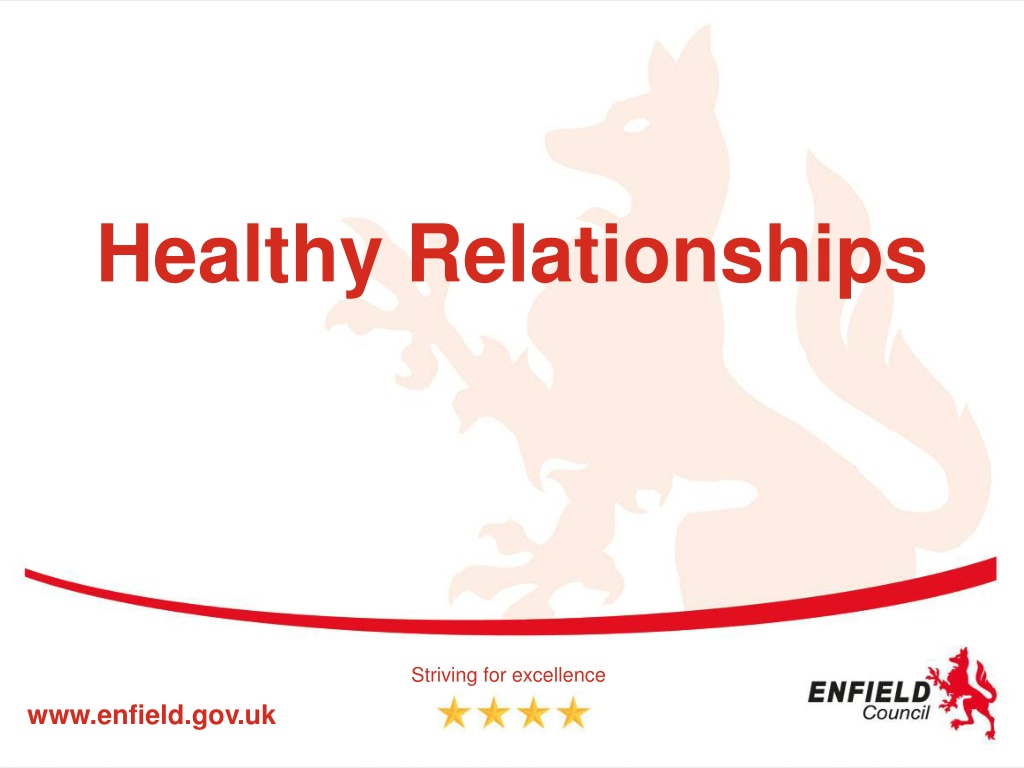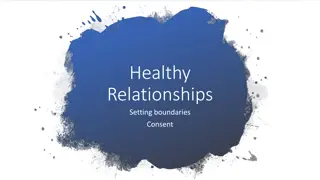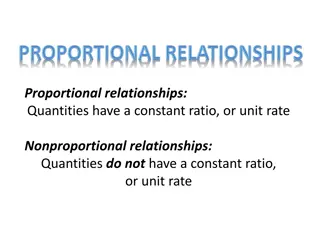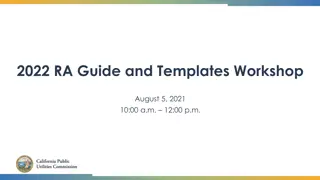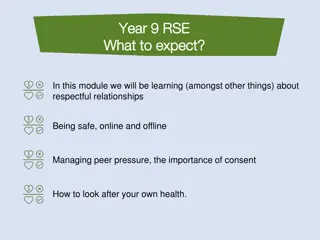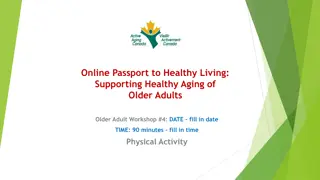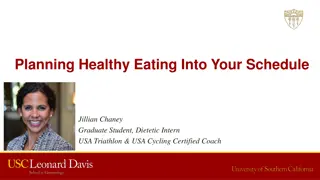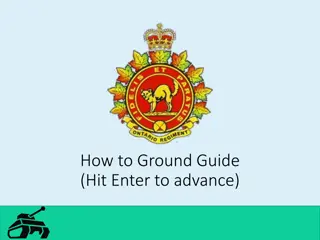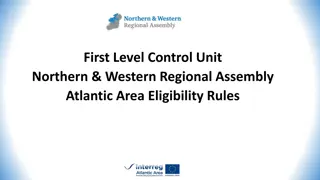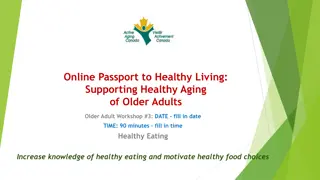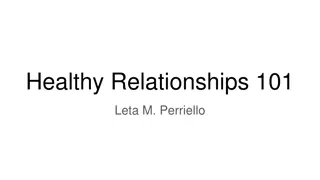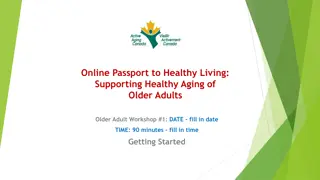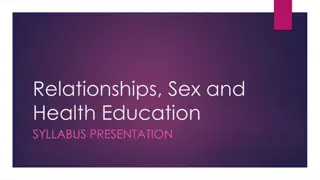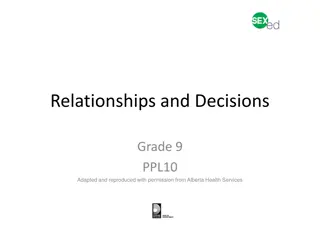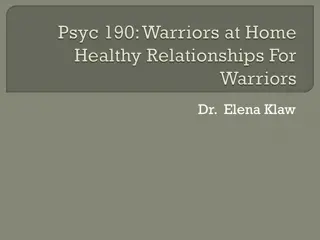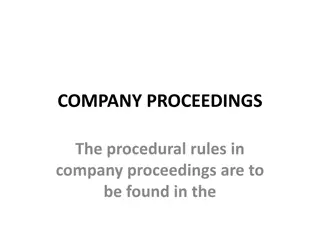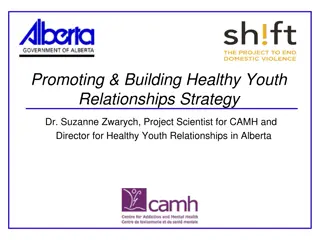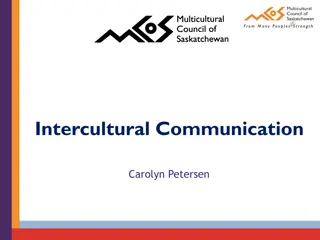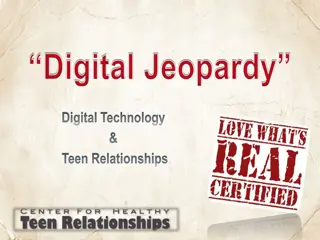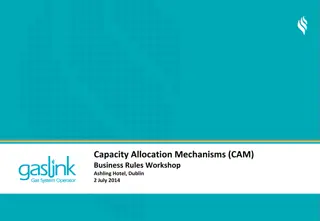Setting Ground Rules for Healthy Relationships Workshop
This workshop focuses on fostering healthy relationships and addressing topics related to domestic violence. Participants are guided on establishing ground rules, creating a safe space, and engaging in icebreaker activities to facilitate meaningful discussions. The session emphasizes respect, confidentiality, and inclusivity, promoting positive interactions and learning environments for all involved.
Download Presentation

Please find below an Image/Link to download the presentation.
The content on the website is provided AS IS for your information and personal use only. It may not be sold, licensed, or shared on other websites without obtaining consent from the author.If you encounter any issues during the download, it is possible that the publisher has removed the file from their server.
You are allowed to download the files provided on this website for personal or commercial use, subject to the condition that they are used lawfully. All files are the property of their respective owners.
The content on the website is provided AS IS for your information and personal use only. It may not be sold, licensed, or shared on other websites without obtaining consent from the author.
E N D
Presentation Transcript
Healthy Relationships Striving for excellence www.enfield.gov.uk
What well cover today Healthy relationships
Disclaimer In this presentation, we will be discussing topics to do with healthy and unhealthy relationships and domestic violence. If for any reason you would like to speak to someone further, please do let us know, and if you need a breather feel free to take a break outside.
Ground rules Respect your peers Listen when someone is speaking Turn off your mobiles and other devices Don t tell other people s stories Confidentiality Feel free to ask questions
How to set ground rules with young people Establish a safe space introduce the aims of the session and explain that for some people these can be challenging or sensitive topics to talk about. Explain the importance of creating a learning environment in which everyone feels safe and respected and able to share their views and listen to others. Ask participants to call out ideas and suggestions and write them on a board / flipchart. Or give each participant a post-it note and ask them to write one thing that they want everyone to do to create a learning environment in which they can participate. Ensure that your space is LGBT+ inclusive. Display the agreement. Refer back to the agreement each session of when you feel is appropriate.
Icebreakers, energisers and warm up activities Icebreakers, energisers and warm up activities encourage participants to have fun and interact with each other before the session start. For ideas go to: https://insight.typepad.co.uk/insight/icebreakers_and_games/
Icebreaker Favourite TV programme/book/ film How do you feel today? Good/Bad/OK? NAME Something else about yourself hobbies, lucky number, favourite colour Where do you work? What do you do?
Statutory RSHE in schools Relationships, Sex and Health Education (RSHE or PSHE) is now compulsory in schools DfE guidance can be found here Respectful relationships, including friendships By the end of secondary schools pupils should know:- The characteristics of positive and health friendships (in all contexts, including online) including: trust, respect, honesty, kindness, generosity, boundaries, privacy, consent and the management of conflict, reconciliation and ending relationships. This includes different (non-sexual) types of relationships. Practical steps they can take in a range of different contexts to improve or support respectful relationships. That in school and in wider society they can expect to be treated with respect by others, and that in turn they should show due respect to others. About different types of bullying. That some types of behaviour within relationships are criminal, including violent behaviour and coercive control.
Statutory RSHE in schools Being safe The concepts of, and laws relating to, sexual consent, sexual exploitation, abuse, grooming, coercion, harassment, rape, domestic abuse, forced marriage, honour- based violence and FGM and how these can affect current and future relationships How people can actively communicate and recognise consent from others, including sexual consent, and how and when consent can be withdrawn (in all contexts, including online). Intimate and sexual relationships, including sexual health How to recognise the characteristics and positive aspects of health one-to-one intimate relationships, which include mutual respect, consent, loyalty, trust, shared interests and outlook, sex and friendship.
Introduction The ability to develop and maintain healthy relationships is one of the most important skills you can develop in life after all, life is comprised of relationships (work, school, college, family, friends, romantic relationship). Maintaining healthy relationships is key to developing a happy, healthy, satisfying life.
Effective communication One of the most important ways we can build healthy relationships is how effectively we can communicate Effective communication is a skill that anyone can learn and use when interacting with others. Effective communication involves the ability to communicate your thoughts and feelings to another person effectively, while at the same time having the ability to understand the messages thoughts and feelings of the other being communicated to you.
Cooperation and Compromise A willingness to cooperate and compromise builds healthy relationships based on trust, respect, caring and responsibility. Compromise is a willingness to give something up to reach an agreement that s respectful of both parties. When both people get some of what they want this is a win-win situation when only one person gets what they want it is a win-lose situation. Learning to resolve conflict successfully so that both people are happy is a good skill to practice.
Relationships graph This can be used to plot either how you view your current relationship or your ideal relationship. This can be friendship or a relationship with a partner. The titles may change!
What makes a good relationship? Divide group into two groups of more and give each group a piece of flip chart. Ask one group to write down what makes a good relationship (positives) and the other to write down what makes a bad relationship (negatives). Bring the groups back together to discuss. Then ask: What do you notice about the positive things listed for the different relationships? (They are often similar, what we expect from one type of relationship could be expected from another type of relationship). What do you notice about the negative things? Do sexual relationships have the same ingredients? Which of the Good relationships list do you think you are good at providing?
Signs of a Healthy Relationship Communicating You talk openly about your feelings without shouting or swearing. You listen to each other, hear each other out, respect each other s opinions, and are willing to compromise. Respectful You value each other as you are. Culture, beliefs, opinions and boundaries are valued. You treat each other in a way that demonstrates the high esteem you hold for one another. Equal You make decisions about where you go and what you do jointly. Your partner gives you freedom to see your friends and family when you want to. Compassionate You feel cared about and loved. Your partner is kind to you and open with you about how they feel. If you are down about something they listen to you and give you support. Trusting You trust each other and this trust has been earned. Making consensual sexual decisions You talk openly about sexual decisions. You both consent to sexual activity and can talk about what is ok and what isn t. If you re having sex you talk about possible consequences, such as pregnancy or STI s. You decide together how to address these things, such as through condoms, birth control or going to get a sexual health screen together.
Signs of a Healthy Relationship Enjoying personal space You both enjoy spending time apart and respect when one of you voices a need for space. Honest You are both honest with each other but can still choose to keep certain things private. For example, you both know that it is important to be honest about things that affect or involve the relationship and still know that it is also ok to keep certain things private.
Signs of an Unhealthy Relationship Not communicating You normally discuss problems calmly but sometimes one of you shouts the other down. You don t listen to each other or try to compromise. Disrespectful One or both of you are inconsiderate toward each other. Your partner occasionally disregards your views, ignores what you say or laughs at you. Unequal One of you makes most of the decisions about where you go. Your partner puts pressure on you to do what they like doing. Unkind Your partner is dismissive if your feelings and occasionally belittles or jokes about how you feel. They are unable to be open about feelings and can be immature when responding to you. Untrusting There is suspicion that your partner is doing things behind your back, or your partner is suspicious of your loyalty without reason. Pressure the other into sexual activity or ignoring the consequences One of you is trying to convince the other that the relationship should become more sexual. Or both of you are consensually sexually active with each other but aren t addressing the possible consequences.
Sings of an Unhealthy Relationship Smothering or trying to stop you spending time with other people So much time is spent together that one of you is beginning to feel uncomfortable. When you express this the other is upset and tried to persuade you not to go out without them. Or sometimes both spend so much time together that they ignore friends, family or other things that used to be important to them. Dishonest One or both partners are telling lies to each other on occasions.
Relationships timeline Draw a timeline on a flipchart: at one end write Meeting someone special and at the other end Having a baby . Write the heading, The ideal relationship above the timeline. Divide the group into 2 and give each group a timeline and markers. Ask them to write different stages in the ideal relationship between the start and end of their timeline, e.g. dating; moving in together. Once complete ask each group to present their timeline. Points to discuss: Which is the most important stage in a relationship? How long might a relationship take to develop? At what point might a couple discuss having sex/using contraception? Is there any difference between straight or gay and lesbian couples? How might this compare with young people s views?
Signs of an Abusive Relationship Communicates abusively During disagreements there is screaming, swearing, or threatening, or these things happen when there is no argument. Your partner is demeaning or insulting towards you or will deliberately punish you following arguments by ignoring you. Completely disregards your personal safety or your views Your partner doesn t care what you think, undermines what you say and disregards your safety. Disregarding your safety might include them getting you to drink too much or encouraging you to take drugs. Totally controlling You re only allowed to make decisions if your partner allows you. You are pressured not to see friends even when he/she can. You are worried to tell your partner what you want to do in case they react badly. Cruel Your partner takes pleasure in you feeling down and deliberately lets you down, winds you up or is nasty to you. Obsessively jealous Your partner won t allow you to be around other people. They put pressure on you to end friendships. They constantly ask where you have been and what you ve been doing.
Signs of an Abusive Relationship Forcing sex or other sexual activities The how, when, and where of sexual activity is determined by your partner. Threats and violence might be used prior to or during sexual activity. You might be pressured into having sex with his / her friends. Isolating you from friends and family Your partner controls where you go, who you see and talk to. You have no personal space and you re often isolated from other people altogether. This isolation can start by your partner making things up about people, telling you that your friends are bad and that the only person who really cares about you is them. Actively lies and doesn t take responsibility for the abuse The violent or verbally abusive partner denies or minimizes their actions. They try to blame the other for the harm they re doing.
What to do when things change? Being in a new relationship can make you feel excited, happy and in control. It s normal to enjoy getting compliments, feeling special and safe or like you ve got more confidence. But relationships can sometimes change and it can be hard to know when things are starting to go wrong. In a healthy relationship someone shouldn t try to control you. Controlling or threatening behaviour can be physical, sexual, emotional, financial or psychological If your relationship doesn t feel right, and you have made reasonable efforts to try to fix it which haven t been taken seriously by your partner it may be time to end it. It can be very difficult both to decide to end a relationship and to identify when it needs to end so if in doubt seek help from trusted friends, family, online / self-help resources and / or mental health professionals.
Domestic Violence and Coercive Control Domestic Violence Violent or aggressive behaviour within the home, typically involving the violent abuse of a spouse or partner. Coercive Control Domestic abuse isn t always physical. Coercive control is an act or a pattern of acts of assault, threats, humiliation and intimidation or other abuse that is used to harm, punish, or frighten their victim. This controlling behaviour is designed to make a person dependent by isolating them from support, exploiting them, depriving them of independence and regulating their everyday behaviour. Coercive control is a criminal offence.
TedX talk on unhealthy relationships https://www.youtube.com/watch?v=9fYyVUXFZ 3U
Resources https://vimeo.com/77711587 https://www.youtube.com/watch?v=9fYyVUXFZ3U https://www.childline.org.uk/info-advice/friends- relationships-sex/sex-relationships/healthy-unhealthy- relationships/ https://sossafetymagazine.com/abuse/4-reasons- people-stay-in-abusive-relationships/
Good practice approaches Ensure that information on age-appropriate support services is available for different groups. For example, signpost to services for: women/girls: Rape Crisis, national domestic abuse helpline men/boys: Survivors UK LGBT people, e.g. GALOP perpetrators, e.g. Respect helpline friendships, bullying, and other concerns, e.g. Childline, Childnet, CEOP, anti-bullying organisations 27
Good practice approaches When teaching about relationships: help pupils practice respect in relationships and to demonstrate how they already treat each other with respect (refer to ground rules) do not assume that all pupils have experienced positive relationships, such as friendships with peers, or relationships with any family members refrain from activities where pupils are asked to name the positive or negative qualities of their own relationships, as this can be very exposing, instead use case studies, characters or examples (e.g. from literature or film) to identify relationship qualities 28
Where to seek help? refuge.org.uk support services for women and children womensaid.org.uk support services for women standingtogether.org.uk support for both men and women mankind.org.uk support for men respect.uk.net support for perpetrators
Contact details and services For pharmacies we can offer: refresher training for C-Card, pharmacist training on EHC under patient group direction and chlamydia screening kits. For school nurses we can offer: SHL 16 plus and C-card training. For schools and other services: support with relationship and sex education, c-card and outreach. Contact sexualhealth@enfield.gov.uk
